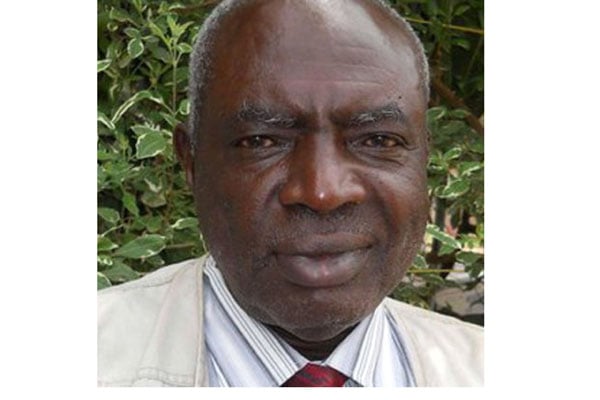Coffee farmers petition govt over pests, drought

William Ongaba Pike, one of the farmers in his coffee plantation in Omoro District. PHOTO/EMMY DANIEL OJARA.
What you need to know:
- They voiced the concerns on Tuesday during a two-day assessment of coffee farmers in the region by the Uganda Coffee Development Authority (UCDA), and the Presidential CEO Forum, established to promote coffee farming
Farmers in northern Uganda have expressed concerns over the numerous challenges affecting coffee farming and production in the region.
They include the lack of a coffee processing machine to add value to their coffee beans, monopoly by middlemen, drought, coffee diseases, bad roads, lack of seeds, and limited support for coffee farming.
They voiced the concerns on Tuesday during a two-day assessment of coffee farmers in the region by the Uganda Coffee Development Authority (UCDA), and the Presidential CEO Forum, established to promote coffee farming.
Ms Lillian Auma, a farmer in Loro Sub-county, Oyam District, said: “From November to February, we have a lot of sunshine and we need to spray those pests and diseases. If we don’t get money to spray them, that is also a challenge.”
She added that they are experiencing challenges of middlemen buying their unprocessed coffee cheaply due to the lack of a processing machine.
“We still don’t have power and sometimes fail even to get good prices from the middlemen. So, when someone comes, even when offering a low price, you just sell,” she said.
Mr Tonny Ongaa, the former chairperson of Loro Coffee Cooperative Society, said they secured a coffee storage facility and coffee huller worth Shs199m through the Agricultural Cluster Development Project (ACDP) but that the machine is lying idle due to the lack of electricity.
“We wrote in a project proposal to the Minister of Agriculture. We were given a grant of Shs199m, which we used for constructing the house and buying the equipment for processing the coffee. The equipment is there but we don’t have the power to run it,” he said.
He added: “They have been taking the coffee to Luweero for processing because the raw coffee (unprocessed) goes for between Shs5,000 and Shs8,000 but the processed ones are sold between Shs10,000 and Shs15,000 per kilogramme, depending on the quality.”
Mr Andama Otubo, the UCDA technical officer, said the coffee hurler installed at Loro Sub-county can remove husks and clean 1,500 kilogrammes of coffee beans hourly and it is meant to serve the northern region.
This publication established that the coffee processor is located about one and a half kilometres away from the power grid and requires about Shs110m to have it connected.
The farmers are also concerned by the prolonged drought, coffee pests such as twig barrowers, coffee thefts, bad roads, and inadequate support from the government.
The impacts of climate change have also been grave on coffee farmers.
“To avert this, I have installed a hand pump borehole in my five acres of coffee farm to do pipe irrigation,” Mr Allan Okello, another coffee farmer in Omoro district, said.
Mr William Ongaba Pike, a coffee farmer with 10 acres of coffee plantations in Omoro District, said: “My biggest challenge is the coffee twig borer which I am trying to control using ethanol bait. My 10 acre farm is very big. If I am to spray it, it becomes very hectic and very dangerous health-wise. So, I am discouraging the use of chemicals,” he said.
He added: “The other challenge is theft, thieves come and still. I am trying to manage them by fencing off the coffee farm but they still come. I cannot sleep in the garden because it is dangerous.”
Mr Bosco Otto, a coffee farmer in the Omoro District, also expressed concern over pests.
“As you can see, this is a problem to our coffee. Twig borer is not leaving us in peace,” he said.
The twig borers affect the coffee primaries (the branches that bear). They lay their eggs on the branches and when the eggs hatch, they burrow inside the primaries, which interferes with the water translocation. It also predisposes the branches to fungal infections, leaving leaves dry and they die.
Ms Janny Winfred Oyella, the northern regional coffee extension officer, said: “The problem he is talking about is a pest, it is called coffee twig borer. Formerly, it was not here but we started experiencing these challenges around May last year. That is when we did pest and disease surveillance and we found it in three gardens. I managed to get two in Omoro and one in Amuru.”
She added: “Currently, we are having these challenges in several farms and we are in touch with National Coffee Research. It is a very serious pest and we consider it more serious than coffee wilt, which was devastating in western and central regions. It is likely to discourage many farmers.”
The pest can be controlled or trapped using a pheromone trap, locally using alcohol or methane in a bottle.
This approach was promoted by President Museveni in a bid to promote coffee farming in the country.
Led by Mr Gerald Kyalo, the director of Development Services at UCDA, and Ms Irene Birungi, the chairperson of the Presidential CEO Forum, the team said they were on a fact-finding mission to ensure that the farmers get redress.
The UCDA Northern Regional Manager, Mr Moses Asiimwe, said there are 82,173 households growing coffee in the north, producing about 30,000 kilogrammes of coffee beans annually.




